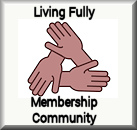Sue Johnson, one of my favourite authors, talks about the importance of sacred time in relationships. Our culture no longer has the norm of family and and sacred ritual time built in. Before (I remember this time) businesses and shops were closed on Sundays signifiying a time for important activities other then work. Now work is a 7 day, 24 hour possibility and many people use their allotment of life ‘time’ to put their energies into their work.Because of this, relationships really suffer. I get very annoyed when one partner is committed to work and keeps their intimate partner waiting in continuing loneliness because of the demands of work. Any fool can make money if they work 7 days a week and 12 hours a day. This is not the definition of a successful life. Anxiety and depression are the highest diagnosis that walk into my office today and in the last decade. Long ago, Bowlby (the famous researcher for attachment in children) understood that anxiety and depression was related to emotional disconnection. In fact, these diagnosis in woman are correlated to dysfunctional relationships. Our emotional well being, our health, our longevity, all depend on our successful emotional attachment in intimacy. Again and again I see relationships and love die due to lack of time and attention. Individuals seem to “hope” their partner will manage themselves during their building years where they spend more and more work time away from their partner. Sacred (worthy of devotion) time gets turned upside down. Emotional affairs occur, sometimes bringing extreme attention and a re-negotiation of the relationship and sometimes couples cannot recover, having lost all hope. What a painful way to lose a relationship. It is time for individuals to make decisions that go against our cultural norms. It is time to re-prioritize what is worthy of our devotion and have our values match our actions. Successful attachment takes time and connection. there is no way around it. Look at your calendar for this past week. Did you prioritize your intimate relationships in your time and energy allotment? Be successful in all the areas of your life. Go forth and be wonderful!
Healthier Marriages – Lynda Chalmers
Make a Great Spouse Day
Oops did not get this posted in time! If you missed spouse day on January 26th – it is not too late. Give both of your days a lift and celebrate your spouse. It is all about appreciation! Some possibilities. Surprise them with their favourite meal. Have a long written list that you will read to them that lets them know how much you appreciate who they are. Add in some thoughts of gratitude about your role as a spouse and their’s too. Appreciate your commitment together. Appreciate both of your willingness to be married together. Many people are so hurt in their relationships these days when one partner refuses to be married. Look at the roles that each of you have – maybe as a father or mother and appreciate how much that means to you to be married to a great mother or father. Look at how you partner together and find some ways to appreciate that in each other. Do this for this week. Your relationship will improve and is worth the effort. Go forth and be wonderful!
Who will you be as a couple in 2017?
Many people are considering who they will be in 2017. Many are setting goals that unfortunately, are rarely sustained past January. But there are few people who are making commitments about how they will show up in the world as an example of a couple who loves well and are trying to have a positive influence on their world. There has probably never been a time as important as now where who you are as a couple will make such a difference in your world. When couples show up in their world at their best, it brings such hope to others. When they see a couple who have a secure attachment relationship, others are drawn to that love and support that they sense in that couple. They respond in a biologically positive way. When you are showing up at your best in the relationship where your partner can count on you, it leaves you with emotional energy to give back to the world. That gives you meaning and gives others much needed hope for our world. This circle of positive influence is both wide and ripples outward and narrowed right into your home with your children or other intimates. How would you go about doing this as a couple this season?
1. Sit together and see what values you share. From this place of togetherness, see where your heart leads you as you put together some possible projects that you would like to contribute together this year. There should be a sense of excitement and energy around these ideas. This might be something that you would like to change in yourself that would benefit the relationship; something that you would like to change in the relationship that would have you showing up more positively in the world; or something that you could contribute as a couple to your community.
2. Have times of reflection and renewal to keep your desires alive together over the next weeks and months. This needs to be built into your calendar together. You will show up together to evaluate how you are doing and to support and encourage each other in your projects together.
Take time to think of the end of your long life and imagine how the decisions to be a great partner and couple in 2017 will make a difference to how you feel you lived your life. Enjoy the process. As usual go forth and be wonderful!
Relationship Triggers – How to Use Them Well
We are often triggered in life and mostly we look at triggers in a negative way. When triggered negatively, we find ourselves having a quick – what feels like a negative response to something from our past that can send us spiraling downward. These triggers are often from unresolved issues in our lives. But we also have spontaneous triggers that we enjoy such as a scent or scene that reminds us of a past event that we experience as a great memory. Because we know that triggers work well in the brain, we can use this knowledge to set up triggers deliberately for good in our relationship. When we want to make a change in ourselves regarding our relationship, we can set up triggers that effectively help us to make that change. For instance, I often recommend to my clients who bring their stress home from the office to find a stop sign close to home (a trigger) to dump their stress and undone ‘to do’ lists, knowing they can pick everything up on the way back to work the next day, if necessary. You can use triggers in other positive ways. What would you like to change in your relationship? Who would you like to be as a partner? How would you like to show up for your partner? Would you like to be a better listener, more supportive, more demonstrative in your affection? Choose one characteristic that you know would make a big difference in your relationship. You can use a trigger to remind you of that characteristic for the next month. For instance, you could use the door you walk into when you arrive home to trigger you of that word and your intention to carry out that characteristic when you walk through the door. Use that door as your trigger for the next month and see how this works. This is a great way to make a change that is easy and works well. Go forth in be wonderful in your relationship today!
Pets that Add Meaning to Our Couple and Family Bonding
It is fall and I am missing the family dog Kirby. It has been awhile since she has been gone, dying of old age. Kirby was a lovely chocolate brown lab that belonged to my son and his family. I was privileged to be the sitter when the family was away and the sanctuary cabin when Kirby got older and the company and their lively puppies became too much for her. We were all, including lots of friends and other family – very attached to her – she had that way about her. We have all been grieving some time over the loss of her. I have many clients who are struggling with the grief of their pet and they can be quite surprised by the depth of emotion evoked by the loss of their pet. It is a shared experience and very real for many of us.
You have probably read pieces titled, “10 things my cat or my dog or my rabbit or whomever taught me”. I was thinking about my relationship with Kirby and all of her characteristics that enriched me. I think that these memories and characteristics do have meaning for our lives and relationships. As with all labs, water was very attractive to Kirby. One of her favourite places was the cabin right on the ocean. She had the idea that when I drove up to her house for any reason, that there could be a chance that she would be hitching a ride to the cabin. She quickly made her desires known that she would be more then glad to join me by jumping into the car and settling where she could, between the packing. On hot days, I would open the window for her and she loved the smells of the journey and the wind on her face. As soon as we arrived at the marina, her tail would be wagging like crazy and she would reacquaint herself with the scents of the paths that other animals had taken, while I unpacked to go to the boat. Kirby was not so fond of the boat ride over to the island as she had some motion sickness. However, she was not going to let a little thing like that stop her and she quickly made her way on to the boat. She often jumped off the boat before it had been securely tied and was looking in the water for any sticks that she might dive into the water for. Fun was her priority. When we arrived at the cabin, and after she had made sure we were staying, she sniffed out all her favourite haunts and then she found a warm place to stretch out and have a little nap.
One of Kirby’s greatest joys and appreciation was food. She knew how to celebrate feasting. I had such fun planning for, purchasing and cooking for Kirby. She loved the giant Christmas bone waiting for her each Christmas. She was very adept at unwrapping the Christmas treats awaiting her. She loved the steak I packed for her for the cabin and the treats in between. When her food ran out next door, she was very happy to have people food cooked for her. Apparently even after I left and went home, Kirby would bark at my cabin door, hoping she would find some gourmet food instead of boring old kibble she had at her cabin.
I remember when the kids were little, how much patience Kirby had with them. One of my favourite memories is of my granddaughter Clara sitting on the floor with her legs apart(she was not of walking age). Kirby would get a ball and pass it back and forth just the few inches that Clara would roll the ball to her. Kirby was happy to do this forever, way past when Clara was done! I remember Kirby’s patience as both my next grandsons would lay all over her and love her and she took it all in. She was very very responsive to compliments and patting and rubs on her back. She would have conversations with you where you would talk and she would answer. You would be sure that she knew what you were talking about together. She was very attached to my son and his family. Her security rested in their presence and relationship. Even though she was happy to be with me she was really connected to my son’s family, her owners. When they left her with me she was very diligent in her watching for the vision and sound of their boat. She did not leave her spot under the trees where she would watch and wait for hours. She knew how to be loyal and loving.
As mentioned, Kirby loved any kind of water play. Even at a very advanced age where she had difficulty walking, she did not let that stop her enjoyment of water. She would still swim for balls and sticks and would follow behind the rowboat as the kids went out for the crab trap and to visit other islands. She knew how to take the time for fun and to engage anyone else she could to join her. I think we all engaged at some point or another, in Kirby’s obsession with flying sticks. I remember when she was a pup that she was fearless in her cliff jumping in the water and would end the day with red rimmed eyes and a wildly wagging tail.
Like the rest of us, she did have some fears. She was very afraid of thunder and lightening and would be very restless and try to find a spot that would enclose her and be close to me when she was visiting me. During the actual storm (which I loved) she would wake me up and dive under my legs between the bed and me, making a cozy nest while she rode out the storm comforted by another. She knew where to find comfort and safety in the presence of those who cared for her.
It was so good to have Kirby as part of my life and I feel blessed by what she added to me by being a part of my life journey. I loved who she was to me and to her family and I miss her today. I know there are others who are also grieving their pets as I speak with you often. I hope this sparks your memories and that you will celebrate the memories as I do of Kirby.
Own and Embrace Your Role as a Partner
I am sometimes amazed when couples come to my office and the important but extraneous parts of their lives have taken over from the vitally important relationship parts of their lives. They are very busy professionals and have agendas for their professional lives but have none for their relationship lives. They have not owned or embraced their role as a partner. There is no time set apart for a date night (no time). They have lost the element of support and empathy for each other (no energy) and sometimes no longer even make love. If that is you, it is time to prioritize your relationship role in your schedule and life. The question needs to be asked of your partner, how can I support you better? How can I love you better? The answer to that question needs to be seen on your calendar, prioritized just like the rest of your life. Life is not never ending and the value you place on your relationship role needs to be honored all the way through your life. Claim your daily agenda. Make sure it is not driven by others but by your values where you increasingly feel congruent by the way you spend your time and by how you feel you are doing in your role as a great partner. Keep on Practicing acts of love with your partner as you are growing into that role as part of becoming more of your best self.
Tips for Getting Unstuck
I wonder why people do not make goals for their relationships as they do for other parts of their lives. When you were going out together at the beginning of your relationship, you put the best of yourself forward. As time has gone on, sometimes your best is reserved for others and your partner gets the worst of you. It might be time for you to become unstuck in this area. Revitalize your relationship by deciding on how you want to be when you show up in your relationship. Use some of the knowledge gained from high performance research to make those goals happen. The first is visualizing your goals – mentally walking through the process of arriving home and being at your best. Shelley E. Taylor at the Univeristy of California found that those who actually visualize how the change will happen (what needs to happen daily) were nearly 2x more likely to succeed in their goals then those who simply looked at the end result of what they wanted (like doing a vision board with the end in mind).
Secondly, the Hope theory by Charles Richard Snyder of the University of Kansas is helpful. I find that those who are stuck in relationship will often lose hope and begin to think perhaps they are not meant to be. Hope is something you need to generate. Snyder found that hopeful thinking has 3 parts. One is setting goals. A second is creating a pathway to reach your goals. And thirdly you need to believe you can achieve those goals. So do not just depend on your will power because I am sure you have done that before. But think about the way power.
The last tip I will leave you with is that the goal must be a deeply held value. When you committed to your relationship, what were the values involved in that? Was connection, love, relationship, service to those you love all there? If so, recommit to those values and do the above to find some way power to get unstuck.
We are fighting our brain when we begin a new habit but as you keep practicing your new behavior a new neural pathway forms and it becomes more your default position. The more you practice the more deeply ingrained that pathway becomes. Go forth and be Wonderful Today!







